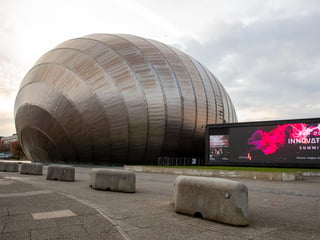Edinburgh academics to help astronomers look deeper into space


Heriot-Watt University has joined forces with the UK Astronomy Technology Centre (UKATC) and academics in the US and Germany to carry out research to give astronomical instruments unprecedented capabilities.
The partners will focus on astrophotonics, a field that aims to harness advances in photonics, which are the optical equivalent of electronics. The work will help astronomers as they look ever-deeper into the universe.
Advertisement
Hide AdAdvertisement
Hide AdThe project has received more than £890,000 in funding from UK Research and Innovation’s Science and Technology Facilities Council, which backs UK academics working in areas including space science and astronomy.
Professor Robert Thomson, head of Heriot-Watt’s Photonic Instrumentation Group, said: “We find ourselves at a point where conventional approaches to optical instruments like telescopes are reaching their limits.
“Astrophotonic technologies offer a route to circumvent these limits and help astronomers discover more about our universe.”
Prof Thomson will lead a group focusing on developing new optical components.
“Our aim is to use advanced photonic manufacturing techniques to fabricate optics that are not limited in their shape like normal optics. In the long term, this will allow astronomical instruments that are more efficient and lower cost,” he explained.
Heriot-Watt colleague Professor Derryck Reid heads a team that will look at improving the way astronomers measure light.
“We’re going to demonstrate a new class of small, ultra-stable lasers that will provide a ‘ruler’ for the wavelength of light. This will allow astronomers to measure the wavelength of starlight extremely precisely, and in a way that allows comparisons over years and even decades,” he said.
“The wavelength signatures of starlight can reveal exciting information about questions such as whether life exists on exoplanets, or if the fundamental constants of physics are in fact changing by tiny amounts.”
Advertisement
Hide AdAdvertisement
Hide AdProfessor Chris Evans, head of science at the UKATC, said: “As we build larger telescopes to look deeper into the universe, they scale upwards in size and cost with traditional optics.
Potential
"Establishing this joint project with Heriot-Watt gives us an exciting opportunity to explore the huge potential of new photonic technologies towards the cutting-edge astronomical instruments of the 2030s and beyond.”
The three-year project also includes partners from the University of Arizona and the Max Planck Institute for Astronomy in Heidelberg, Germany.
A study last year found that the income from Scotland's growing space sector could exceed £2 billion by 2030.
Firms already active in the industry include Spire Global, a data and analytics company that has a base in Glasgow. It builds, tests and operates the world’s fourth-largest fleet of nanosatellites tracking aviation, maritime and weather patterns and received a combined investment and grant of £14.7 million from Scottish Enterprise in 2019.
Last September, Spire Global sent the first of four nanosatellites into space with powerful super computers on board to track world trade and predict the arrival time of boats to help port authorities manage docks safely.
A message from the Editor:
Thank you for reading this article. We're more reliant on your support than ever as the shift in consumer habits brought about by coronavirus impacts our advertisers.
If you haven't already, please consider supporting our trusted, fact-checked journalism by taking out a digital subscription.
Comments
Want to join the conversation? Please or to comment on this article.
